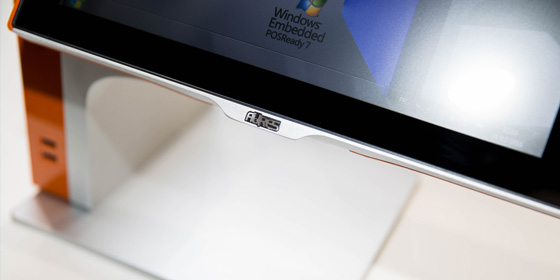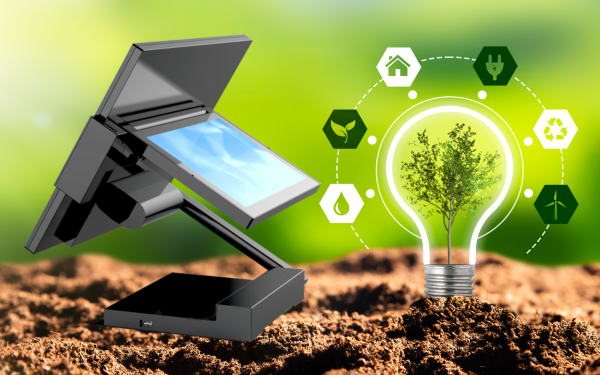No business can afford to shirk its responsibilities when it comes to the environment. In the retail and hospitality industries, consumers demand nothing less. 61% of consumers now expect brands to have a clear set of sustainability practices, while 47% say they won’t buy from brands that contravene these values.
That’s why adopting more eco-friendly and sustainable practices has to be a business priority for retailers, restaurateurs, hoteliers, leisure operators and more. It’s one of the main things a lot of customers look for when choosing where to spend their money.
Businesses have to look at all areas of their operations to assess where improvements can be made. This includes their POS systems and other digital and IT infrastructure. Like all digital hardware, POS endpoints run on electricity, which brings questions about energy consumption and carbon emissions into the equations.
Along with all the other many billions of computerised devices that are in use around the world, POS equipment also contributes to the problem of what to do with all this hardware when it stops working. At present, far too much ends up in landfill, with non-decomposing plastics either being burnt, which adds to the carbon emissions issue, or left in the ground permanently, meaning the heavy metals used in computer chip manufacture leak into and pollute water tables.
At AURES, we are committed to doing our part to make POS greener and more sustainable, so our customers can pass on those benefits to theirs. Here are five ways we see POS becoming more environmentally friendly.
Choose long-life, durable hardware
One of the best ways we can help make POS more sustainable is by manufacturing our products to be tough, resilient and to last as long as possible. Longer operational life means fewer devices having to be replaced, and therefore fewer defunct devices to dispose of.
Far from the ‘planned obsolescence’ many electronic device manufacturers get accused of – the idea of making products less durable so they need to be replaced regularly to boost sales – we make it a defining principle of our brand that all AURES products are built to last. It’s about guaranteeing continuity and enduring quality of performance to our customers as much as anything else, as well as minimising downtime and repair and replacement costs. But it also helps to reduce so-called e-waste.
Recycle components
E-waste, or waste from discarded electronic devices, is a major environmental issue. 85% of e-waste around the world is either dumped in landfill or incinerated. With the toxic chemicals released when plastics are burnt plus the aforementioned heavy metals used in chip manufacture getting into water and food systems, e-waste accounts for a staggering 70% of all toxic waste.
Building devices to last longer can slow down the build-up of e-waste. But the only way to significantly reduce e-waste volumes is to recycle more. Even when a POS terminal reaches the end of its operational life and is beyond repair, many of the components can be recycled.
Switch from paper to digital receipts
A really easy way to make point of sale operations more sustainable is to move away from printing paper receipts. More and more businesses are now asking consumers if they want or need a receipt – but still have their POS set up to automatically print one off, so they end up going straight in the bin. This is an easy fix.
Long term, moving to digital receipts only makes sense. With Bluetooth and web push technology, receipts can be sent to a smartphone instantly with a simple tap. If customers set up accounts, receipts can be sent how they like – via email, SMS, to an app on their phone etc. It’s another reason to push account subscriptions and gather invaluable customer data. A great example of this is using the likes of NOUMI. NOUMI is a point-of-sale solution which provides an app that can single handedly allow customers so save all their digital receipts in one place. Your customers can wave goodbye to lost, crumpled and damaged receipts and help save the planet at the same time! NOUMI provides other business benefits too, such as reducing operating costs, data analytics, in-app marketing promotions, incentives, and loyalty, as well as increased sustainability and ecological business practice in the switch from paper to digital. More on NOUMI here.
Move into the Cloud
More and more businesses are running cloud-based POS software platforms because they are more flexible, scalable, cost-effective and easier to manage. They are also greener, too.
There are challenges for the data centre operators that host cloud services to meet in terms of increasing energy efficiency and reducing their carbon footprint. But it is still much more efficient, and therefore greener and more sustainable, to combine computing infrastructure in data centres than it is to have lots of small, on-premise server stacks running at every business location.
Adopt remote maintenance
Finally, another benefit of the increased digitisation of POS systems is that more and more of the provisioning, maintenance and even operational repair work can be done remotely. It wasn’t that long ago that every issue with a POS system required an engineer to attend site. That’s a lot of vehicles burning a lot of fuel.
Nowadays, unless it’s a genuine hardware fault, most problems can be resolved remotely. And even those that can’t, they can be diagnosed remotely so only a single trip is required, with the right component to put the issue right without the need for a repeat visit.




